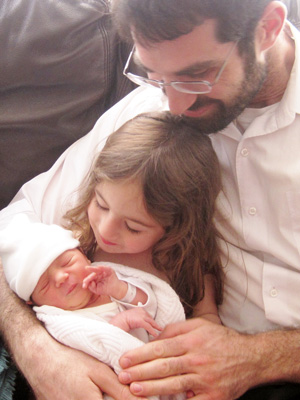Cravings and Contentment
Permanent link All Posts
My son and I have reached a new milestone. We can learn together! I'm not referring to math or science, of course, but Torah study. We open up the Torah together, start reading and -- here comes the best part -- we start blasting questions at each other left and right.
Why did Moses say that? Why did the people respond this way? Isn't that an extra word? What's the Torah trying to teach us with this verse? And we start to make a list of our questions together. Then, after we fully prepared our masterpiece of critique, we go back over the list and start looking for answers through deeper analysis of the text, searching our ancestral commentaries, and through our own reflection.
So I want to share with you an example of the latter, an answer that came from a joint father-son reflection on last week's Torah portion.
On Shabbat afternoon, my son came to join me for our study time in the local Chicago Community Kollel (a place for advanced Torah study). We began our critique. The three verses we were scrutinizing came from Numbers (11:4-6), which takes place as the Children of Israel were in the desert on their long journey from Egypt to Israel.
The verses talk about a group of people amongst the Children of Israel who were beginning to crave meat. They start complaining about where will they find meat and describe all the fantastic food they were fed for free in Egypt. Perhaps you even thought of one of our questions, "there was no free food in Egypt! They wouldn't even give them hay for their bricks! What are they talking about 'free food?'" (If you're interested, Rashi's medieval commentary addresses this question). In the next verse as they describe their craving for meat they say, "But now, our life is dry, there is nothing…" We asked a simple question, "What do the words really mean when they said, 'life is dry,' or in Hebrew, 'nafshenu yevesha?'"
To answer this question, we utilized an exegetic technique of searching for where the word yevesha, dry, appears in the Torah to understand its true meaning. Interestingly, the word first appears in the depiction of the third day of creation. Before there was any life on the land, it says, "the yabasha, dry land, was revealed." We started to think about what the world looked like before there were any animals, flowers, people, or plants. It looked like an empty and desolate existence.
We then took our new meaning of the word "dry" as depicting an empty and desolate existence and applied it to our verse. They found themselves craving a desire for something they seemingly couldn't have. And once they were in a place of wanting something that they couldn't receive, they felt as if "our life is dry," an empty and desolate existence. Why? They were living through miracles every day! They just escaped horrific slavery not too long ago. What changed?
The answer is that one thing changed. They now felt a craving. They now desired other things that they couldn't have. This was too hard for them.
When we want something that's not within our ability to have, we begin to feel "dry" even though we're objectively not. I gave my son an analogy to explain our discovery in the text. It's like when a little child comes home happy from school with a big smile across his face. He remembers that there are popsicles in the freezer, and he asks for one. When his mother says no, all of a sudden his whole mood changes. He gets very upset, frowns across his face, and eventually he might even throw a tantrum. What happened? He was just super happy two minutes ago! The answer is what the text is telling us here.
We can easily lose sight of the good and beautiful things around us when we are consumed with cravings for things that are beyond us. We start to feel like our lives our dry, desolate and empty, even when they aren't. I then explained to him that big kids and even grownups are the same way. We can easily get consumed by what we don't have and lose sight of what we do. And the way to combat it is by focusing on what you do have, to be excited about the wonderful gifts you're given on a regular basis.
As for me, I will try to focus on the precious opportunity I have of being able to learn meaningful Torah lessons for life with my son.



